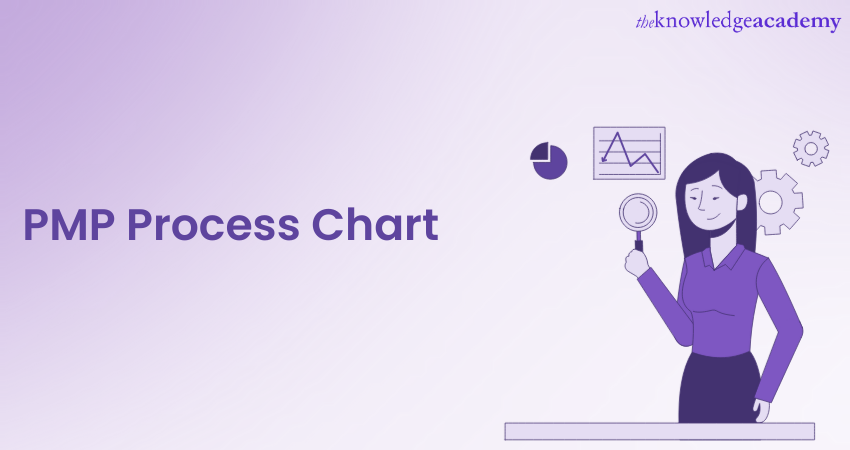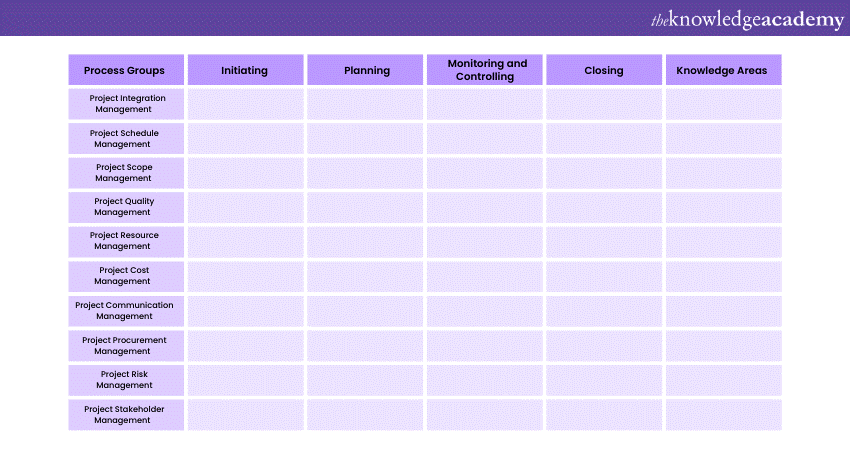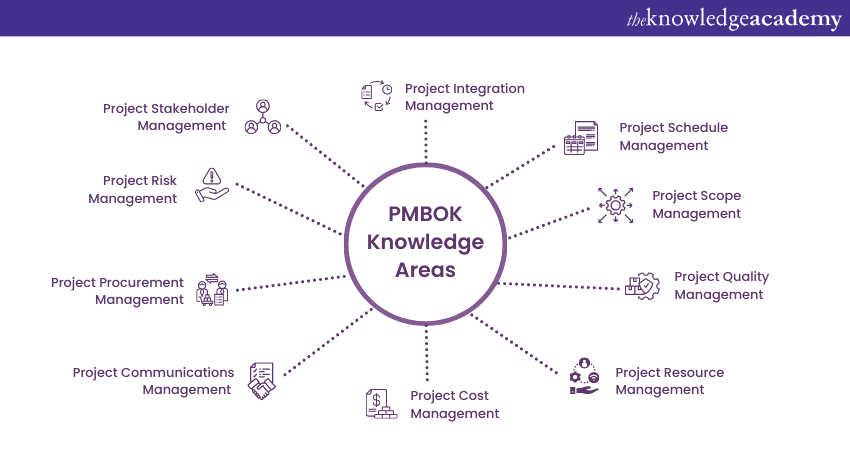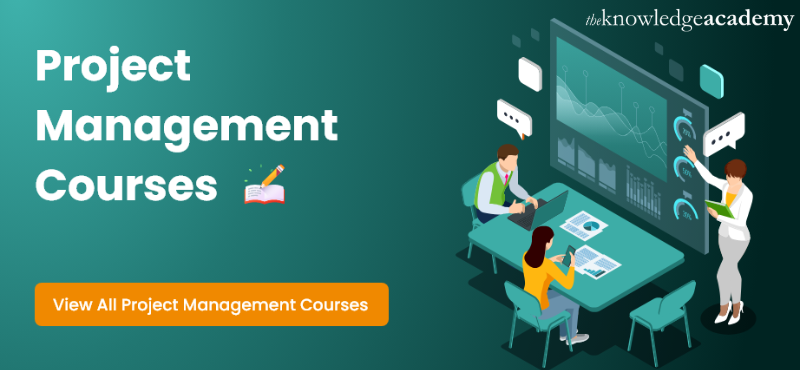We may not have the course you’re looking for. If you enquire or give us a call on 01344203999 and speak to our training experts, we may still be able to help with your training requirements.
Training Outcomes Within Your Budget!
We ensure quality, budget-alignment, and timely delivery by our expert instructors.

PMP Process ChartIf you have searched online for PMP Process chart or Knowledge Areas, you surely have completed reading a few pages of the Project Management Body of Knowledge (PMBOK) Guide. Well, if you want to gain an in-depth understanding of PMP Process Charts, you’re at the right place. This blog will help you understand everything related to Project Management Processes, Process Charts, and Project Management Knowledge Areas.
If you are up for the PMP exam preparation preparation, understanding the PMP Process Chart is crucial to passing the exam. Reading this blog will help you understand PMP Process Charts and Knowledge areas required to excel in the PMP Exam. Preparing a PMP Process Chart is also essential for delivering successful projects and bringing value to the organisation. Thereby, making it even more important for PMP aspirants to learn about PMP Process Charts.
Table of Contents
1) What is PMP Process Chart?
2) What are the Project Management Processes?
3) How to create and memorise the PMP Process Chart?
4) This is how your Process Chart Should look like
5) What are the five PMBOK Phases or Process Groups of Project Management?
6) The 10 Project Management Knowledge Areas
7) The difference between PMBOK Knowledge Areas and Process Groups
8) Conclusion
What is PMP Process Chart?
PMP Process Chart is an essential tool for anyone who aims to complete their task without any obstacles. This Chart provides a visual representation of the Project Management Processes.
The Process Chart illustrates how various activities in the project lifecycle are interconnected to each other. The activity flow helps understand the relationship between the components and how essential it is to finish the project. The Project Management Institute (PMI) has been a pioneer in helping organisations worldwide enhance their Project Management expertise. Additionally, PMI developed the Process Chart in order to help Project Management Professionals deliver successful projects efficiently.
What are the Project Management Processes?
In the PMBOK Guide, Processes are described as a set of actions performed to develop a product or service in the form of a project. Project Management processes ensure the appropriate flow of the project activities throughout its completion.
The PMBOK Guide is divided into ten parts, where each part covers a particular Knowledge Area. This Guide describes 49 processes, each of which pertain to that specific Knowledge Area, and each process is classified as part of a Process Group.
Start your preparation from here – sign up for the Introduction to Project Management course!
How to create and memorise the PMP Process Chart?
Each part of the PMBOK Guide expands on each Knowledge Area in the Process Chart. Hence, it would help if you memorised the chart for the exam. Let's discuss how we can remember this:
Stage 1: Start by drawing a 6X11 chart.
Draw a table with 11 rows and 6 columns to develop the Process Chart.
Stage 2: Then move on to writing your Process Groups and Knowledge Areas
On the top-most row, write down all 5 phases of project management – Initiating, Planning, Executing, Monitoring and Controlling, and Closing
Use this short sentence to remember the Process Groups easily – “In Paris Emily May Cry Constantly”.
In the first column, list the ten Knowledge Areas.
The ten Knowledge Areas are –
a) Project Integration Management
b) Project Scope Management
c) Project Schedule Management
d) Project Cost Management
e) Project Quality Management
f) Project Resources Management
g) Project Communications Management
h) Project Risk Management
i) Project Procurement Management
j) Project Stakeholders Management
Use this short sentence to remember the 10 Knowledge Areas easily – I Saw Two Crows Quietly Relishing Coffee and Reading Poetic Songs.
Now your PMP Process matrix should look something like this:

Stage 3: Now fill these corners.
Fill these four processes in the Process Chart:
1) Developing the Project charter
2) Identifying Stakeholders
3) Closing the Project
4) Closing Procurement
This is how it will look after this stage:
|
Process Groups |
Initiating |
Planning |
Monitoring and Controlling |
Closing |
Knowledge Areas |
|
Project Integration Management |
Developing Project charter |
|
|
|
Closing the Project |
|
Project Scope Management |
|
|
|
|
|
|
Project Schedule Management |
|
|
|
|
|
|
Project Cost Management |
|
|
|
|
|
|
Project Quality Management |
|
|
|
|
|
|
Project Resource Management |
|
|
|
|
|
|
Project Communication Management |
|
|
|
|
|
|
Project Risk Management |
|
|
|
|
|
|
Project Procurement Management |
|
|
|
|
Closing Procurement |
|
Project Stakeholder Management |
|
Identifying Stakeholders |
|
|
Stage 4: There are 10 processes that begin with the word “Planning,” and they all fall in the Planning Process Group.
1) Planning Scope Management
2) Planning Schedule Management
3) Planning Cost Management
4) Planning Quality Management
5) Planning Resource Management
6) Planning Communication Management
7) Planning Risk Management
8) Planning Risk Responses
9) Planning Procurement
10) Planning Stakeholder Management
|
Process Groups |
Initiating |
Planning |
Monitoring and Controlling |
Closing |
Knowledge Areas |
|
Project Integration Management |
Developing Project charter |
Developing Project Management Plan |
|
|
Closing the Project |
|
Project Scope Management |
|
Plan Scope Management |
|
|
|
|
Project Schedule Management |
|
Planning Schedule Management |
|
|
|
|
Project Cost Management |
|
Planning Cost Management |
|
|
|
|
Project Quality Management |
|
Planning Quality Management |
|
|
|
|
Project Resource Management |
|
Planning Resource Management |
|
|
|
|
Project Communication Management |
|
Planning Communications Management |
|
|
|
|
Project Risk Management |
|
Planning Risk Management |
|
|
|
|
Project Procurement Management |
|
Planning Procurement Management |
|
|
Closing Procurement |
|
Project Stakeholder Management |
|
Identifying Stakeholders |
Planning Stakeholder management |
|
Stage 5: Next stage is to fill in the "Estimate" processes into the Planning Process Group in the same way you did in stage 4. It is filled in at the intersection of the Planning Process Group and the Schedule Management Knowledge Area.
|
Process Groups |
Initiating |
Planning |
Monitoring and Controlling |
Closing |
Knowledge Areas |
|
Project Integration Management |
Developing Project charter |
Developing Project Management Plan |
|
|
Closing the Project |
|
Project Scope Management |
|
Plan Scope Management |
|
|
|
|
Project Schedule Management |
|
Planning Schedule Management |
|
|
|
|
Project Cost Management |
|
Planning Cost Management |
|
|
|
|
Project Quality Management |
|
Planning Quality Management |
|
|
|
|
Project Resource Management |
|
Planning Resource Management |
|
|
|
|
Project Communication Management |
|
Planning Communications Management |
|
|
|
|
Project Risk Management |
|
Planning Risk Management |
|
|
|
|
Project Procurement Management |
|
Planning Procurement Management |
|
|
Closing Procurement |
|
Project Stakeholder Management |
|
Identifying Stakeholders |
Planning Stakeholder management |
|
Stage 6: The next stage is to fill in the 4 Perform Processes.
1) Perform Integrated Change - From the Project Integration Management Knowledge Area
2) Perform Quality Assurance - From Project Quality Management Knowledge Area
3) Perform Qualitative Risk Analysis - From Project Risk Management Knowledge Area
4) Perform Quantitative Risk Analysis – From Project Risk Management Knowledge Area
Stage 7: Next fill in the Planning Process Group.
1) Develop Project Charter - From Project Integration Management Knowledge Area
2) Develop Project Management Plan - From Project Integration Management Knowledge Area
3) Develop Schedule - From Project Time Management Knowledge Area
4) Develop Project Team - From Project Resource Management Knowledge Area
Stage 8: Next fill in the Control Process Group. They fall under the Monitoring and Controlling Process Group.
1) Monitor & Control Project Work - From Project Integration Management Knowledge Area
2) Perform Integrated Change Control - From Project Integration Management Knowledge Area
3) Control Scope - From Project Scope Management Knowledge Area
4) Control Schedule - From Project Time Management Knowledge Area
5) Control Costs - From Project Cost Management Knowledge Area
6) Control Quality - From Project Quality Management Knowledge Area
7) Control Communications - From Project Communications Management Knowledge Area
8) Control Risks - From Project Risk Management Knowledge Area
9) Control Procurements - From Project Procurement Management Knowledge Area
10) Control Stakeholder Engagement - From Project Stakeholder Management Knowledge Area
Stage 9: Next coming to the Project Management process ‘Manage’ - there are three of them which fall under the Executing PMP Process Group
1) Manage Project Team - From Project Resource Management Knowledge Area
2) Manage Communications - From Project Communications Management Knowledge Area
3) Manage Stakeholder Engagement - From Project Stakeholder Management Knowledge Area
Stage 10: This is the last stage, where you have to fill the rest of the processes
1) Validate Scope - From Project Scope Management Knowledge Area
2) Collect Requirements - From Project Scope Management Knowledge Area
3) Define Scope - From Project Scope Management Knowledge Area
4) Create WBS - From Project Scope Management Knowledge Area
5) Define Activities - From Project Time Management Knowledge Area
6) Sequence Activities – From Project Time Management Knowledge Area
7) Determine Budget - From Project Cost Management Knowledge Area
8) Acquire Project Team - From Project Stakeholder Management Knowledge Area
9) Conduct Procurements - From Project Procurement Management Knowledge Area
Want to gain a certification that demonstrates your Project Management skills and experience? Sign up for PMP Certification Training!
This is how your Process Chart should look like
Let's see how these all come together under the 49 processes chart of Project management.
|
Process Groups |
Initiating |
Planning |
Monitoring and Controlling |
Closing |
Knowledge Areas |
|
Project Integration Management |
Developing Project charter |
Developing Project Management Plan |
Directing and Managing project work |
1. Monitoring and controlling project work 2. Performing integrated change control |
Closing the Project |
|
Project Scope Management |
|
Plan Scope Management |
|
Controlling the Scope |
|
|
Project Schedule Management |
|
Planning Schedule Management |
|
Controlling the Schedule |
|
|
Project Cost Management |
|
Planning Cost Management |
|
Controlling Costs
|
|
|
Project Quality Management |
|
Planning Quality Management |
Performing quality check |
Controlling quality |
|
|
Project Resource Management |
|
Planning Resource Management |
1. Acquiring Resources 2. Developing the Team 3. Managing the Team |
Controlling the Resources
|
|
|
Project Communication Management |
|
Planning Communications Management |
Managing Communications |
Monitoring Communications |
|
|
Project Risk Management |
|
Planning Risk Management |
Implementing Risk Responses |
Monitoring Risk |
|
|
Project Procurement Management |
|
Planning Procurement Management |
Conducting Procurement |
Controlling Procurement |
Closing Procurement |
|
Project Stakeholder Management |
Identifying Stakeholders |
Planning Stakeholder management |
Planning Stakeholder Management |
Managing Stakeholder Engagement |
What are the five PMBOK Phases or Process Groups of Project Management?
Now, let's understand what are the Project Management Process Groups in PMBOK Guide:
1) Initiation of the Project
2) Planning of the Project
3) Execution of the Project
4) Monitoring and controlling the project
5) Closing or implementing the project
The 10 Project Management Knowledge Areas
There are 10 Knowledge Areas in PMBOK. Each Knowledge Area represents an area of specialisation, concepts, PMP tools, techniques, and tasks. In other words, to properly manage a project, you must be familiar with project completion factors such as schedule, budget, and quality level.
Knowledge Areas are used to group PMP Process, considering how challenging the processes are to memorise . You, as a PMP, must be able to distinguish between these areas and employ them in the projects based on the project's requirements. Let's understand what are these 10 PMBOK Knowledge Areas in detail:

1) Project Integration Management
Project Integration involves integrating the project components and the different Knowledge Areas together. The responsibility of the integration lies in the hands of the Project Manager. The Project Manager is designated the duty of an ‘integrator’, which lets them drive the project’s momentum to completion.
The Project Managers basically integrate the work of other employees in addition to the processes and tasks involved.
Integration Management contains seven PMP Processes, of which the Project Charter is the first key deliverable in the first process. All the project stakeholders come together to develop the Project Charter.
The Project Charter is a document derived from the original project’s business case and is utilised by organisations for authorising their internal projects.
This Knowledge Area has seven of the 49 processes which are spread across all five Process Groups.
2) Project Schedule Management
Project Schedule Management plays a crucial role in Project Management, as it can affect resources, costs and the project's overall success. Schedule Management teaches the development, maintainence, monitoring, and evaluation of schedules.
You can stand out as a PMP, by integrating time into your project schedules, which are often overlooked by amateur PMPs. A quality project schedule involves precisely calculated work durations and applied constraints.
Project Schedule Management contains seven of the 49 PMP processes involved. Six of these come under the planning process group and one under the monitoring and controlling process group.
3) Project Scope Management
The Project Scope Statement describes the project's objectives, needs, and limitations such as timing and budget. For the project to be successful, the Project scope must be accurately defined.
A Project Manager must ensure that they define, measure, monitor, and control the Project scope. They should ensure that there aren't any changes in the project that were not agreed upon earlier in the Project scope.
Project Scope Management contains six processes, four of which come under the planning process group and two under the monitoring and controlling process group.
4) Project Quality Management
Project Quality Management requires that you perform all tasks necessary to ensure the project quality. The quality assurance includes conducting meetings, developing quality plans, managing project documents, and establishing project controls.
Project Quality Management has three processes from the planning, executing, and monitoring process groups.
5) Project Resource Management
Resource Management demands the allocation of available resources to each project activity.
Additionally, integrating, managing, and monitoring the project resources for each activity is pivotal to the project’s progress. Defining the project boundaries is another important factor to manage the planned scope of the project.
There are six processes in the Project Resource Management Knowledge Area. They fall under the planning, execution, monitoring, and controlling Process Groups.
6) Project Cost Management
Each project in an organisation has an allotted budget. Budgeting, cost estimation, and tracking actual expenditures are the essentials of Project Cost Management.
Each project has a different budget based on the size, duration, resources involved, and complexity of the project. Keeping track of the budget of your other projects is very important, as it will help you foresee your affordability of new projects.
This area has four processes, divided into two process groups. Three belong to planning, while one belongs to the monitoring and controlling process group.
7) Project Communications Management
Communications Management aims to reduce the project's possible negative repercussions. As a Project Manager, you must maintain control over all internal and external project-related communications. It includes managing communication for both internal and external stakeholders.
This Knowledge Area has three processes from planning, execution, monitoring, and controlling Process Groups respectively.
8) Project Procurement Management
Procurement Management is concerned with procuring products and services for projects, coordinating procurement operations, handling contractual problems relating to suppliers and vendor agreements, and assuring compliance with business rules.
This Knowledge Area has three of 49 processes, each of which falls under planning, executing, monitoring, and controlling.
9) Project Risk Management
Risk Management deals with identifying and assessing risks, managing risks, and developing contingency plans to mitigate or avoid them. Risks can affect the project's schedule, budget, quality, resources, and client satisfaction.
Seven PMP processes in this Knowledge Area are from the planning, executing, monitoring, and controlling Process Groups.
Also, check out our blog to know more about Risk Management in PMP!
10) Project Stakeholder Management
Finally, the success or failure of a project is determined by how your project is delivered to the stakeholders. The Project Stakeholder Management Knowledge Area deals with creating an organisational climate in which stakeholders' interests are critical to project success. This Knowledge Area includes four processes from the PMP's 49 processes.
Secure your future in Project Management! Check out our Project Management courses!
The difference between PMBOK Knowledge Areas and Process Groups
The structure of Project Management includes both PMBOK Knowledge Areas and Process Groups. Below are a few differences which distinguish the PMBOK Knowledge Areas from Process groups:
1) PMBOK Knowledge Areas
The Knowledge Areas are standard Project Management guidelines which include terminology that pertains to what you need to know in Project Management. , 2. Process Groups in PMBOK deal with the project activity during project management. 3. Knowledge Areas are twice as much in number as Process Groups and the differences can be interchangeably understood.4. Knowledge Areas provide distinct areas designed to assist you in reviewing your Project Management practices.5. Knowledge Areas are generally associated with the planning aspect of a project.
2) Process Groups:
1) Process Groups in PMBOK tell you what you need to do in Project Management.
2) They assist you in applying your knowledge of the various professional areas in Project Management.
3) Process Groups are a component of the structure of Project Management, in which they map out the steps necessary for project completion.
4) Process Groups are repeated throughout the project and have clearly defined dependencies. The groups are designed to interact with one another during the project.
5) The project work is usually carried out according to the Process Groups.
With your expertise in Processes, you will be able to guide your team throughout the project.
Conclusion:
You will find it easier to learn about the PMP Process Chart after reading this blog. The Process Chart will be a great first step in your preparation for the PMP certification exam Remember that practice will get you well-versed with PMP concepts like PMP Processes. Process Chart and Knowledge Areas.
Frequently Asked Questions
Upcoming Project Management Resources Batches & Dates
Date
 PMP® Certification Training Course
PMP® Certification Training Course
Sat 4th May 2024, Sun 5th May 2024
Tue 7th May 2024
Mon 13th May 2024
Sat 18th May 2024, Sun 19th May 2024
Mon 20th May 2024
Tue 28th May 2024
Mon 3rd Jun 2024
Mon 10th Jun 2024
Sat 15th Jun 2024, Sun 16th Jun 2024
Mon 17th Jun 2024
Mon 24th Jun 2024
Sat 29th Jun 2024, Sun 30th Jun 2024
Mon 1st Jul 2024
Mon 8th Jul 2024
Sat 13th Jul 2024, Sun 14th Jul 2024
Mon 15th Jul 2024
Mon 22nd Jul 2024
Sat 27th Jul 2024, Sun 28th Jul 2024
Mon 29th Jul 2024
Mon 5th Aug 2024
Sat 10th Aug 2024, Sun 11th Aug 2024
Mon 12th Aug 2024
Mon 19th Aug 2024
Sat 24th Aug 2024, Sun 25th Aug 2024
Tue 27th Aug 2024
Mon 2nd Sep 2024
Sat 7th Sep 2024, Sun 8th Sep 2024
Mon 9th Sep 2024
Mon 16th Sep 2024
Sat 21st Sep 2024, Sun 22nd Sep 2024
Mon 23rd Sep 2024
Mon 30th Sep 2024
Sat 5th Oct 2024, Sun 6th Oct 2024
Mon 7th Oct 2024
Mon 14th Oct 2024
Sat 19th Oct 2024, Sun 20th Oct 2024
Mon 21st Oct 2024
Mon 28th Oct 2024
Sat 2nd Nov 2024, Sun 3rd Nov 2024
Mon 4th Nov 2024
Mon 11th Nov 2024
Sat 16th Nov 2024, Sun 17th Nov 2024
Mon 18th Nov 2024
Mon 25th Nov 2024
Sat 30th Nov 2024, Sun 1st Dec 2024
Mon 2nd Dec 2024
Mon 9th Dec 2024
Sat 14th Dec 2024, Sun 15th Dec 2024
Mon 16th Dec 2024







 Top Rated Course
Top Rated Course




 If you wish to make any changes to your course, please
If you wish to make any changes to your course, please


